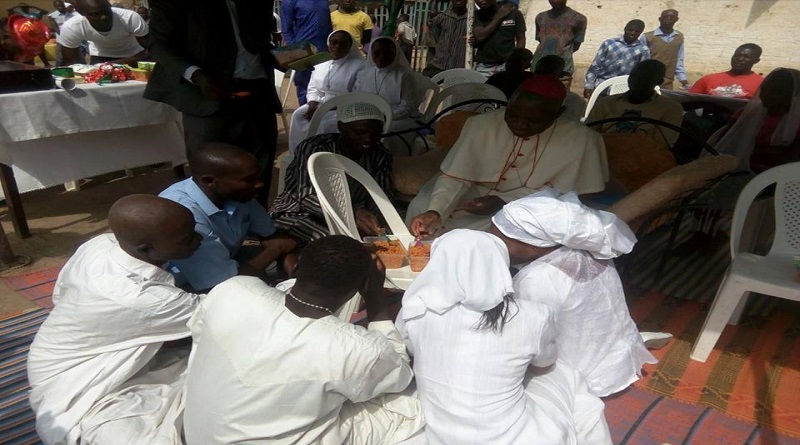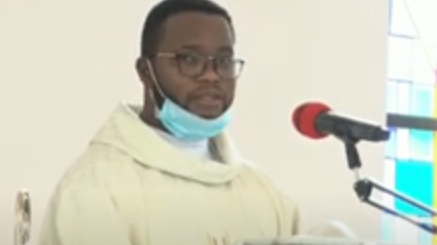The sin of indifference
by ARCH BISHOP · September 25, 2022
TWENTY SIXTH SUNDAY, YEAR C, ST. EDWIN’S PARISH, KUBWA, SEPTEMBER 25, 2022, HOMILY BY ARCHBISHOP I. A. KAIGAMA.
Readings: Amos. 6:1, 4-7; Ps. 145(146): 7-10; 1 Tim. 6: 11-16; Lk. 16: 19-31.
The sin of indifference
The readings this Sunday open our eyes to the presence of the poor among us and teach us not to neglect them but to make concerted efforts to alleviate their suffering and pain. In the first reading, Prophet Amos speaks against the rich and influential persons of the society who oppress the weak and the poor. They take pleasure in food, drink, best oils, exotic music, and material comfort and derive their joy and comfort from the miseries of the poor and the weak. The Prophet warns against the false confidence which is based on material resources and fortunes and suggests a life of modesty, moderation and selflessness. St. Paul in the second reading urges Christians to “…fight a good fight of faith to win for yourselves the eternal life to which you are being called…” (1 Tim. 6:12). The door to eternal happiness is open to all. However, only those who work for it with faith, patience, love, perseverance, and reverence for God and neighbour will merit entering in.
Jesus’ parable of the rich man and Lazarus has some important lessons to teach us in life:
-
Use material things you have wisely to obtain the kingdom of God by building friendship with others, instead of a lifestyle of negligence, complacency, extravagance, and excessive luxury.
-
Death is a common denominator between the rich and the poor here on earth. Thus, we are told, “Lazarus died, and the rich man also died.” Sometimes we get carried away by our class distinctions and forget our common humanity and begin to treat other people like people below our dignity. For those who have security escorts, housemaids, gatemen, drivers, stewards, etc, how do we treat them? How do they feel in our presence and how do they feel when we are not there. Are they happy when we are around or happier when we are not around?
-
Heaven and hell are real. After this world, one can either go to heaven or hell. To be able to go to heaven, use your wealth to build bridges across board, instead of building walls; touch the lives of other people especially the less privileged in the society. Do not be too conscious of your wealth or money and forget the essence of them, which is service to humanity.
- People of means today should have an idea of what their subjects are going through. They should not only notice when they fail to render a service but also when they are in need or trouble. Appreciate those who serve especially in lowly positions in government, private homes or organizations. Pay them a just wage, and ensure that they get their pension, gratuity and other entitlements fairly and promptly.
-
The parable teaches us that charity to one’s neighbour especially the poor is an investment that no one would ever regret after this life. Jesus says, “do not store up for yourselves treasures on earth, where moth and rust destroy and where thieves break in and steal, but store up for yourselves treasures in heaven, where no moth nor rust destroys and where thieves do not break in and steal. For where your treasure is, there will your heart be also” (Mt. 6: 19-21).
- Today we are enjoined not to put our trust and hope in riches even when they increase (cf. Ps. 62:10). We should rather open our eyes to see the needs of others. Jesus’ invitation to love is based on the experience of the love of God Himself. In Luke 6:36, He says, “Be compassionate, even as your Father is compassionate.”
- The present situation of poverty, deprivation and lack in our country is very worrisome. To ignore the poor is to ignore Christ in whose image they were created. St. John Chrysostom aptly recalls: ‘Not to enable the poor to share in our goods is to steal from them and deprive them of life. The goods we possess are not ours, but theirs…. When we attend to the needs of those in want, we give them what is theirs, not ours. More than performing works of mercy, we are paying a debt of justice’ (Catechism of the Catholic Church, no. 2446). It is our desire that God will raise serious civil and political leaders who are sensitive and sympathetic to the needs of our nation and ensure that concrete measures are taken to alleviate poverty and suffering; leaders who are very conscious of the four last things, ‘death, judgment, heaven and hell’. I urge the candidates for confirmation and all of us to be good neighbours, with an open heart to be kind to others in need. However poor of material wealth, we are all rich enough to share our blessings and talents with others, even just a simple genuine smile.




